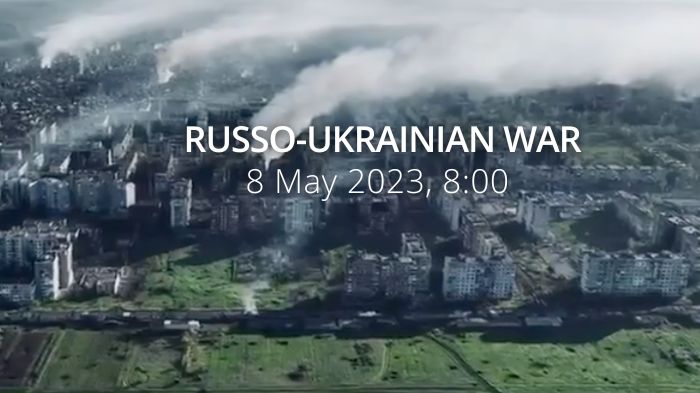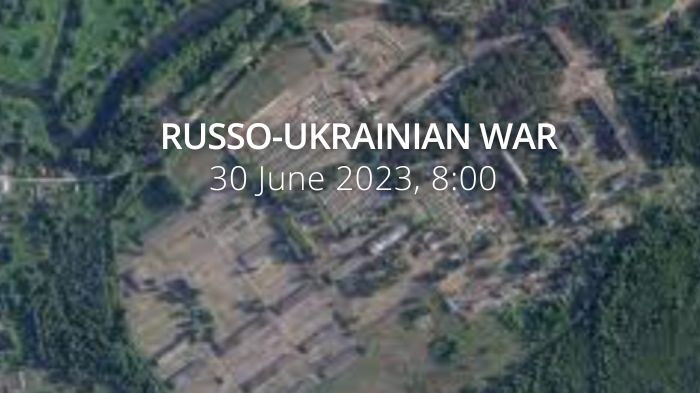Wagner and Kadyrov to start receiving ammunition for continued offensive in Bakhmut. Russian forces made some territorial gains in Bakhmut. Ukraine launches up to 23 drones at Crimea. Russia forcefully evacuates the population from the occupied parts of Zaporizhzhia Oblast.
https://twitter.com/EuromaidanPress/status/1655238919120617473
Daily overview — Summary report, May 8
A map of the approximate situation on the ground in Ukraine as of 00:00 UTC 08/05/23. pic.twitter.com/R67RyL6vrt
— War Mapper (@War_Mapper) May 8, 2023
The General Staff’s operational update regarding the Russian invasion as of 18.00 pm, May 8, 2023 is in the dropdown menu below:
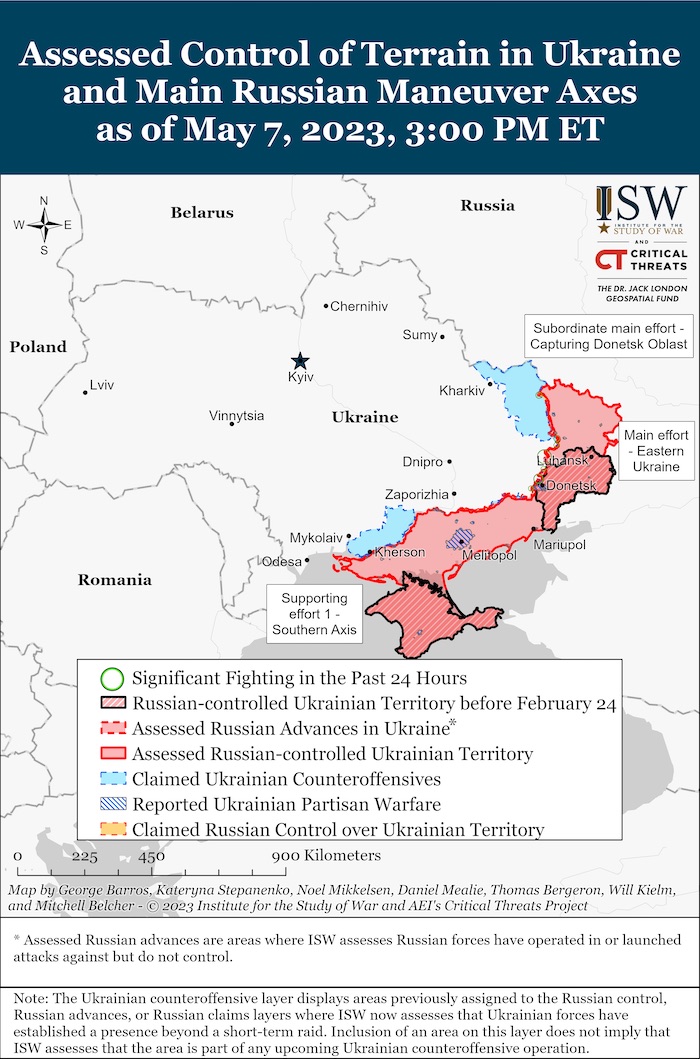
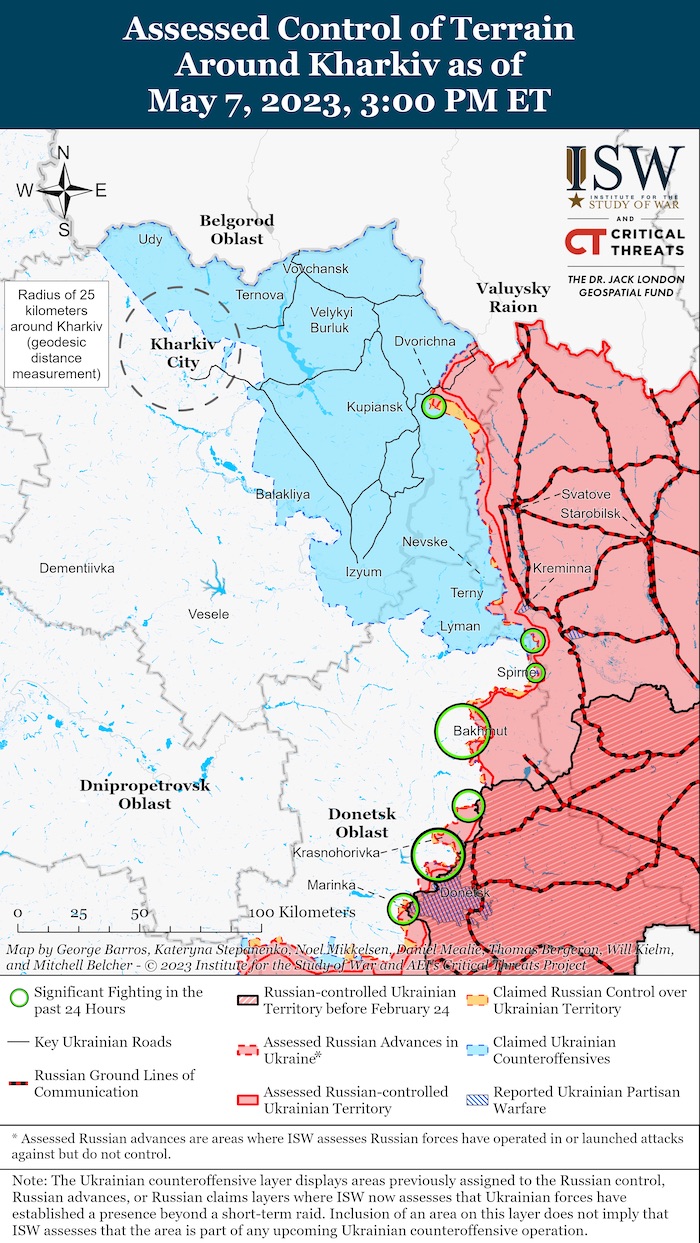
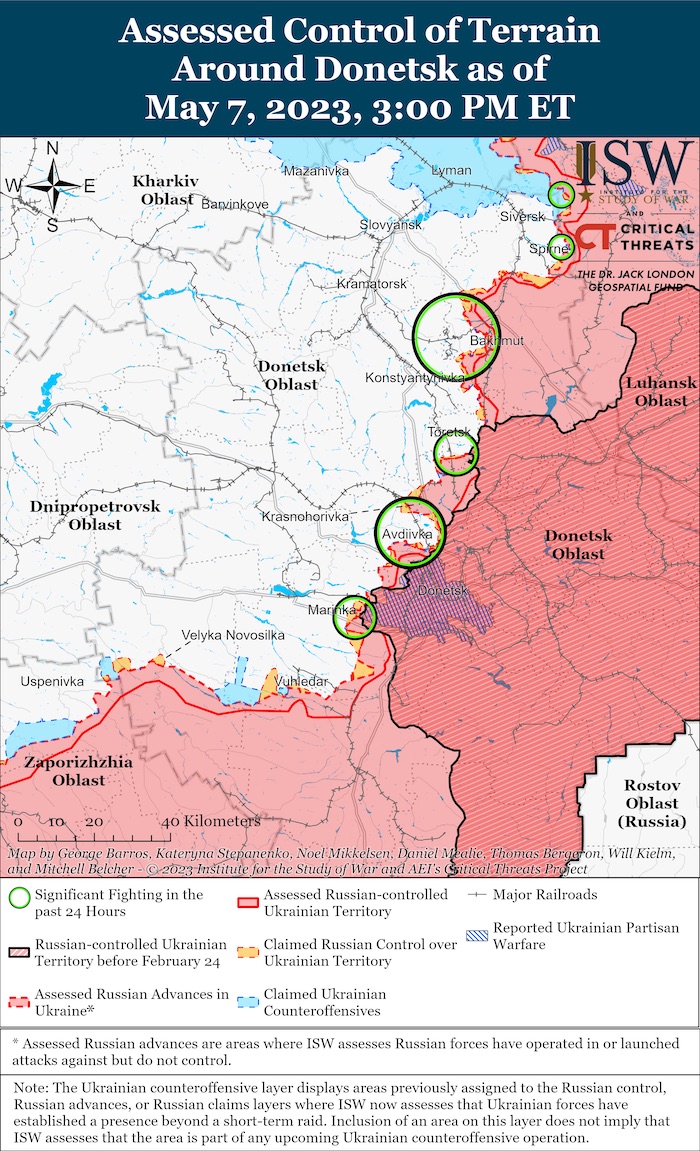
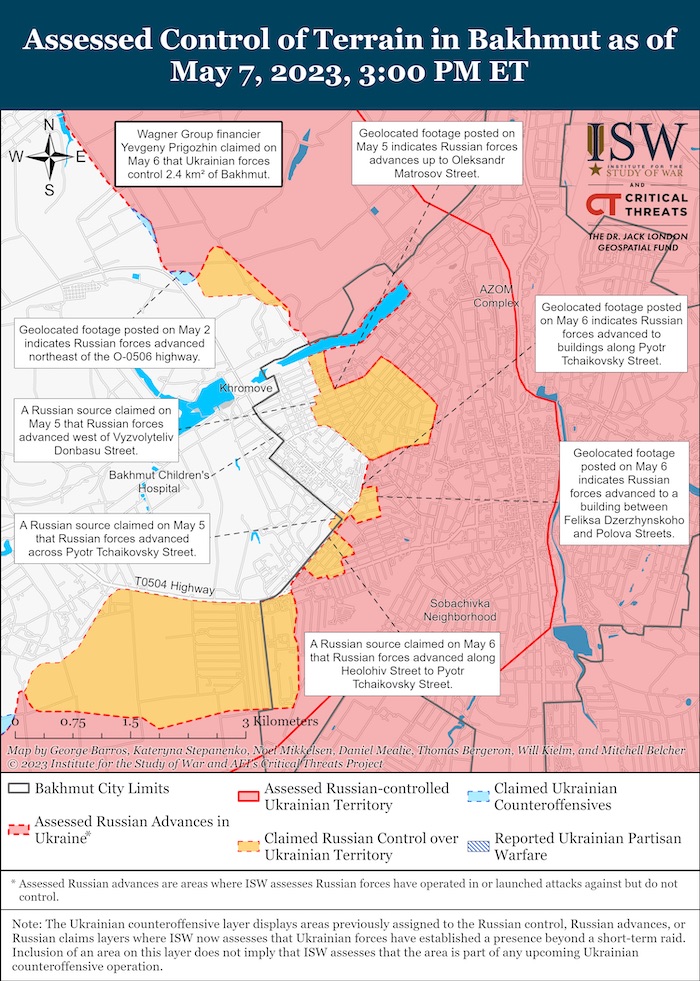
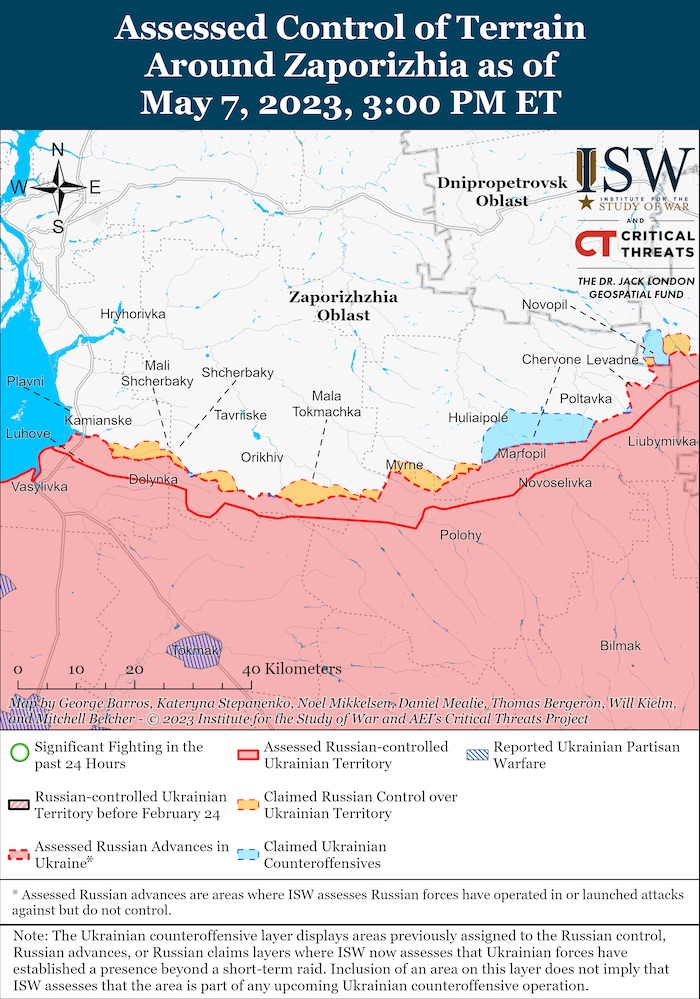
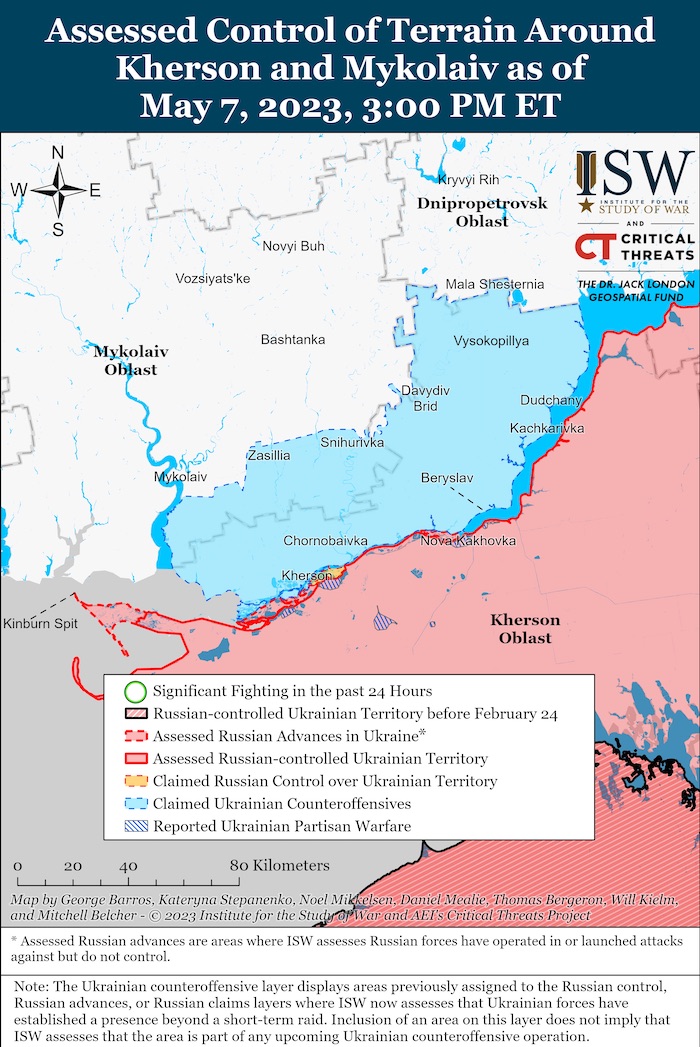
Military Updates
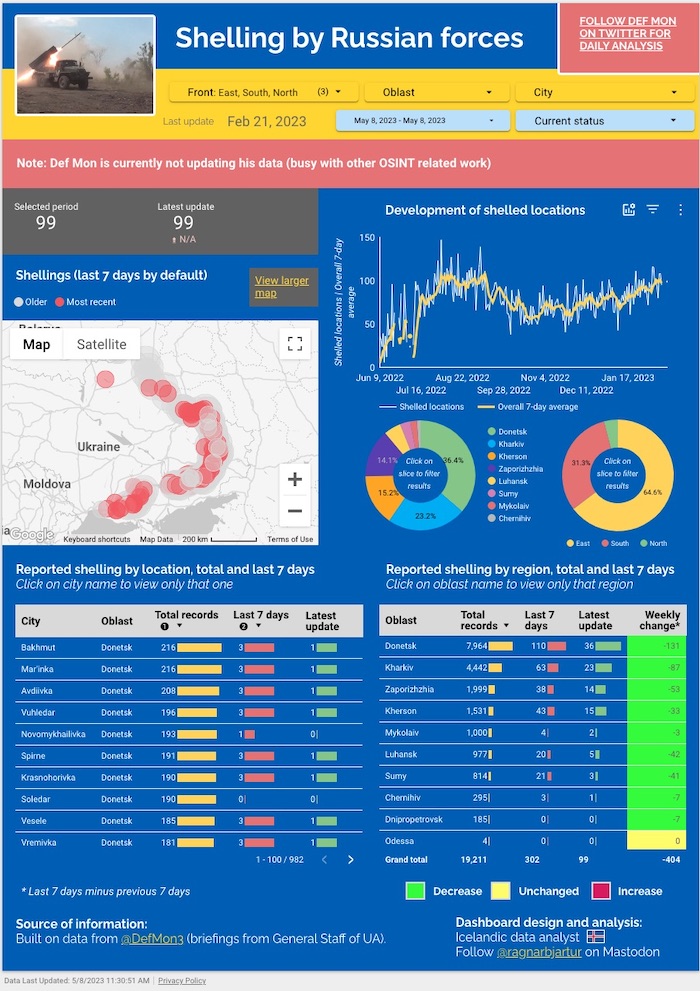
Ukraine receives three RADA radars produced by Israeli defense technology company to detect Russian missiles. On 4 May, Ukraine received three RADA ieMHR radars produced by the Israeli company DRS RADA Technologies, according to the Lithuanian non-governmental organization, “Blue/Yellow”, which gathers donations for the Ukrainian Army.
Russia has no potential for serious offensive but capable of carrying out defensive operations – Ukrainian intel. In his interview with Yahoo News, Maj-Gen Kyrylo Budanov, the head of Ukraine’s Main Directorate of Intelligence, said that Russian forces could no longer launch a “serious offensive anywhere in Ukraine” but still could carry out defensive operations.
https://twitter.com/EuromaidanPress/status/1655227958435487747
Frontline report: Russians attack all over Donetsk Oblast anticipating Ukrainian offensive. Russians noticed that Ukrainians were accumulating forces in and around Donetsk’s Vuhledar and, in anticipation of a Ukrainian offensive operation, started bombing and attacking the whole region.
Russia’s Wagner mercenaries in Bakhmut to be replaced by Kadyrov’s troops. Evgeny Prigozhin, the owner of the private Russian military company Wagner Group, announced that he would hand over the positions of his mercenaries in Bakhmut to the troops of Chechen leader Ramzan Kadyrov. Kadyrov most likely can obtain all the necessary resources to take up Wagner’s positions in Bakhmut, Prigozhin said, implying the alleged shortage of ammunition that Wagner Group has experienced recently during its offensive operations in Donetsk Oblast.
Russia ups its drone game with “mosquito fleets” and electronic warfare. Russians first were losing to Ukraine’s drone volunteers, but have now taken UAVs seriously. Russians have become more serious about using drones and developing countermeasures against Ukrainian UAVs, including new weapons such as electromagnetic weapons. This information was shared by Viktor Taran, the head of the Center for Training UAV Operators “Kruk,” in an interview with Defense Express.
Russia-Ukraine war "has seen drones go from next frontier of parcel delivery to cutting edge of warfare technology, with the rapid development of AI set to accelerate things even faster."https://t.co/EuoeFju013
— Euromaidan Press (@EuromaidanPress) May 7, 2023
According to British Defence Intelligence, (last 48 hours):
- Russian military recruiters have been targeting central Asian migrant workers in Russia to serve in Ukraine. Recruiters have visited mosques and immigration offices to recruit. At immigration offices, staff who speak Tajik and Uzbek routinely attempt to recruit migrants.
- Radio Free Europe reported recruiters offering sign-up bonuses of USD $2,390 and salaries of up to USD $4,160 a month. Migrants have also been offered a fast-track Russian citizenship path of six months to one year, instead of the usual five years.
- The high monthly salary and sign-up bonuses will entice some migrant workers to sign up. These recruits are likely sent to the Ukrainian frontlines where the casualty rate is extremely high.
- Recruiting migrants is part of the Russian Ministry of Defence’s attempts to fulfil its target of 400,000 volunteers to fight in Ukraine. The authorities are almost certainly seeking to delay any new overt mandatory mobilisation for as long as possible to minimise domestic dissent.
Losses of the Russian army
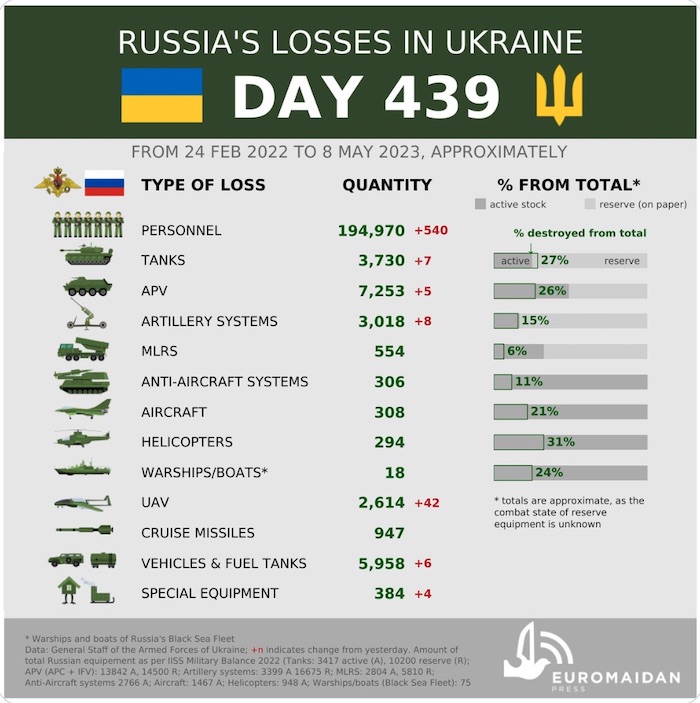
Humanitarian
https://twitter.com/EuromaidanPress/status/1655263779037257728
Friends, relatives, and comrades mourn American volunteer killed in action in Ukraine. On 5 May, soldiers of the International Legion of Ukraine, friends, and family gathered at Kyiv’s St. Michael’s Cathedral to say farewell to American military veteran Christopher James Campbell, who had been killed a month ago in a battle for the eastern city of Bakhmut. His mother joined the farewell ceremony online from her house in Florida, the Voice of America reported.
https://twitter.com/EuromaidanPress/status/1655209387386863616
Russian shelling kills six civilians in Kherson Oblast, governor says. The Ukrainian governor, Oleksandr Prokudin, reported that on 6 May six civilians were killed and four injured in Russian shelling, which deliberately targeted residential buildings in Kherson Oblast. According to him, Russian troops hit the region with 237 projectiles launched from heavy artillery, “Grad” rocket launcher, tanks, and aircraft.
Environmental
https://twitter.com/EuromaidanPress/status/1655284074246807552
Moldova considers banning Ukrainian grain imports. The government of Moldova, Ukraine’s neighboring country, is considering joining an EU ban on Ukrainian grain, the Agriculture Minister of Moldova Vladimir Bolea said following today’s meeting with the Ukrainian Minister of Agrarian Policy and Food. Despite the plans to impose a grain ban on Ukraine, Moldova will allow the transit of Ukrainian food products through its territory, Vladimir Bolea said.
Legal
Public execution and savage torture for supporting #Ukraine in #Russia occupied #Skadovsk (#Kherson oblast)#Mudryenko #StandWithUkraine #StopRussia #RussiaWarCrimeshttps://t.co/YYu72c6O0o pic.twitter.com/dZ8PvRNnin
— Euromaidan Press (@EuromaidanPress) May 8, 2023
Public execution and savage torture for supporting Ukraine in Russian-occupied Skadovsk. Both the Ukrainian authorities and the Russian invaders underestimated the level of civic activism and patriotism in Kherson oblast, a recent study by Liudmyla Tiahnyriadno, writing for the ZMINA Human Rights Centre, suggests. The Russians who swarmed into parts of Kherson oblast at the beginning of Russia’s full-scale invasion expected to be greeted with open arms, and instead met with anger and resistance, with locals taking part in pro-Ukrainian demonstrations and partisan activities. The Russians began opening fire and hurling smoke grenades to drive the protesters away, and hunting down all those seen as a threat for their pro-Ukrainian position and their activism. The city remains under occupation, and it is impossible for investigators to probe the most horrific allegations regarding the public execution of 58-year-old Tetiana Mudryenko, who certainly appears to have been killed because of her pro-Ukrainian position.
Belarusian blogger Mikalay Klimovich, who was jailed for posting an online caricature of the country’s authoritarian ruler, Alexander Lukashenko, died in penal colony
Klimovich had suffered a heart stroke before being sentenced to 1 year in prison-RFE/RLhttps://t.co/HwyalWSPvP
— Euromaidan Press (@EuromaidanPress) May 8, 2023
Support
https://twitter.com/EuromaidanPress/status/1655298317910175745
US, Ukraine tweak HIMARS’ software to counter Russian jamming efforts – CNN. Russia has been thwarting HIMARS rocket systems in Ukraine more frequently in recent months, using electronic jammers to throw off its GPS-guided targeting system to cause rockets to miss their targets, CNN reports referring to “multiple people briefed on the matter.” “In recent months, the systems have been rendered increasingly less effective by the Russians’ intensive blocking, five US, British and Ukrainian sources tell CNN, forcing US and Ukrainian officials to find ways to tweak the HIMARS’ software to counter the evolving Russian jamming efforts,” CNN says. A US official said software updates were made to both the targeting system software and the rockets. Updates had been made as recently as this week, a Pentagon official said, according to CNN.
US and Ukraine top military chiefs discuss Ukrainian counteroffensive. On 6 May 2023, the Commander-in-Chief of Ukraine’s Armed Forces, General Valerii Zaluzhnyi, talked over the phone with the US Chairman of Chiefs of Staff, General Mark Milley. During the phone call, the Commander-in-Chief of Ukraine’s Armed Forces informed the US Chairman of Chiefs of Staff about preparations for the future counteroffensive operations of the Ukrainian Army. General Zaluzhnyi told his colleague about the current situation on the battlefield and expressed gratitude for the US military aid package announced earlier this week.
New Developments
https://twitter.com/EuromaidanPress/status/1655331925421064195
Fire breaks out at construction site in Moscow. On 7 May, residents of Moscow reported seeing a massive black cloud of smoke which was caused by a fire at a construction site of the largest Russian construction company “PIK” located less than nine km from the FSB Academy, as per Baza Telegram channel. According to initial reports, the blaze started after garbage and construction materials caught fire. Emergency services are currently working to extinguish the blaze, but the cause of the fire remains unknown.
Labor shortage in Russia “almost certainly” worst in decades – UK Defense Ministry. In its latest intelligence update, the UK Defense Ministry says Russia is facing its worst labor shortage in decades due to emigration, an aging population, and mobilization. The ministry tweeted:
- “Russia is almost certainly facing its worst labour shortage in decades. The Russian Central Bank surveyed 14,000 employers and found that the number of available employees was at its lowest level since 1998.”
Assessment
- On the war.
The Institute for the Study of War has made the following assessment as of May 7, 2022:
Wagner Group financier Yevgeny Prigozhin and Chechen leader Ramzan Kadyrov may have compelled the Russian theater commander in Ukraine, Army General Valery Gerasimov, to resume artillery ammunition distribution to the Wagner forces in Bakhmut despite Gerasimov’s desired de-prioritization of that effort. Prigozhin announced on May 7 that he had obtained a document from the Russian Ministry of Defense (MoD) that promised to supply Wagner forces with the ammunition and weapons necessary to maintain offensive operations in Bakhmut.[1] Prigozhin has not published the official document and ISW cannot verify Prigozhin’s claims at this time. The Russian MoD likely has not fundamentally changed its intention of deprioritizing offensive operations and conserving munitions across the theater, as ISW has recently assessed. Prigozhin and Kadyrov likely effectively blackmailed the Russian MoD into allocating resources to Wagner forces in Bakhmut by threatening to pull Kadyrov’s Chechen forces from other parts of the theater to relieve Wagner forces in Bakhmut.[2] Prigozhin also claimed that the MoD gave Wagner complete freedom of operations in Bakhmut and appointed Army General Sergey Surovikin as an intermediary between the MoD and Wagner, actions that would indicate that Gerasimov and possibly Minister of Defense Sergei Shoigu lack the ability to command Prigozhin and Kadyrov as subordinates but must instead negotiate with them as peers.[3] This assessment assumes that Prigozhin’s claims that the MoD was withholding shells but has now agreed to supply them are true—the MoD has made no official statements regarding those claims—and Ukrainian officials report that they have not observed a decline in Wagner shelling during this period (see below).[4]
Kadyrov’s threats to transfer his forces to Bakhmut may have blackmailed the Russian military command into allocating ammunition to Wagner mercenaries. Kadyrov published a letter on May 6 asking Russian President Vladimir Putin to order Russian Defense Minister Sergei Shoigu and Director of the Russian National Guard (Rosgvadia) Viktor Zolotov to authorize the transfer of Chechen “Akhmat” units from “other directions” to assume Wagner’s positions in the Bakhmut direction.[5] Kadyrov’s letter to Putin bypassed the Russian chain of command, and the withdrawal of Chechen forces from other parts of the theater likely posed a risk to Russian defensive lines, a risk that Gerasimov and Shoigu, or Putin, appear to have been unwilling to take. ISW previously observed Akhmat units operating in the Bilohorivka area on the Svatove-Kreminna line and in Zaporizhzhia Oblast, and their withdrawal from those positions might undermine Russia’s defensive preparations ahead of the planned Ukrainian counteroffensives.[6] Shoigu and Gerasimov, who have been consistently loyal to Putin’s orders, may alternatively have decided to allocate ammunition to Wagner at Putin’s direction. Kadyrov’s and Prigozhin’s apparently successful joint blackmail efforts further indicate that Gerasimov does not actually control all the Russian forces in Ukraine, despite being the nominal theater commander. Gerasimov likely attempted to assume control over all Russian irregular forces over the winter of 2023 but had failed in that endeavor even before losing favor with Putin in the spring.[7]
Kadyrov likely supported Wagner’s blackmail efforts against the Russian military command in order to reestablish his position within the circle of power in the Kremlin. Kadyrov had previously held an influential position within Putin's close circle until apparently losing favor recently, likely because his forces played a limited role in active combat operations in Ukraine throughout the late fall of 2022 and winter of 2023.[8] Putin belittled Kadyrov during their meeting on March 13 where Kadyrov appeared visibly nervous when reporting on the Chechen fighters’ role in Ukraine.[9] Kadyrov likely saw Prigozhin’s threats to withdraw from Bakhmut as an opportunity to play up the effectiveness of his forces against the backdrop of Gerasimov‘s and Shoigu’s failures to deliver decisive victories during the winter-spring offensive.
Gerasimov's apparent need to negotiate with subordinate commanders and those commanders’ ability to force his hand suggests that chain of command problems are having a significant impact on the Russian military’s ability to conduct coherent theater-wide operations. The position of overall theater commander should in principle allow Gerasimov to command any Russian unit or ground forces commander in Ukraine, even those in charge of irregular formations such as Wagner and Akhmat. Prigozhin and Kadyrov appear to be able to largely make independent decisions concerning their forces, however, a phenomenon that appears to have become more pronounced the longer these forces have had de facto control over certain sectors of the frontline. Wagner and the Russian MoD appeared to have recently reached an agreement about the delineation of responsibilities between conventional and irregular forces. The Russian military command deployed Russian Airborne Forces (VDV) to defend the flanks around Bakhmut around when Wagner began advancing in the city itself, for example.[10] ISW previously assessed that the Russian military command had likely recently decided to reprioritize efforts and resource allocation to prepare to receive potential Ukrainian counteroffensive operations but did not set conditions to appease Prigozhin or offset Wagner’s likely degradation in the Bakhmut area.[11] The subsequent upheaval over the de-prioritization of Bakhmut and the Russian military command's reversal on supplying Wagner is likely to undermine this theater-wide effort.
These events raise questions about Russia’s ability to coordinate a coherent theater-wide defensive campaign. The Russian military command appears to be increasingly delegating responsibilities for different sectors of the front in Ukraine to various Russian commanders while the power of the theater commander continues to wane.[12] Gerasimov’s degraded abilities to control his commanders will likely further limit the Russian military’s ability to conduct coherent operations involving different areas of responsibility. ISW has previously assessed that factional dynamics within the Russian military are shaping decision-making to an unusual degree, and the increasing erosion of the Russian chain of command is likely caught in a self-reinforcing feedback loop with the Russian military’s growing factionalism.[13] ISW assesses that Putin is unlikely to remove Gerasimov as overall theater commander for reputational reasons, and therefore Prigozhin’s and Kadyrov’s public undermining of Gerasimov may have lasting impacts on the power of the overall theater commander’s position.[14] Putin may seek to reward commanders he favors with responsibility beyond their official positions instead of outright appointing them to higher positions.[15] The Russian military is highly unlikely to solve these chain of command issues in the near term, and these problems will likely influence how Russian forces on different axes respond to potential Ukrainian counteroffensive operations.
Prigozhin’s and Kadyrov’s ability to significantly influence the Russian military command decisions relies on Putin’s willingness to appease them and his reliance on their forces, both of which will likely degrade after further blackmail efforts. Both Prigozhin and Kadyrov retain likely differing amounts of favor and personal contact with Putin despite their individual tensions with the Russian military command.[16] The decision to blackmail and subsequently humiliate the Russian military command may have expended a fair amount of Prigozhin‘s and Kadyrov’s political capital to influence operational and strategic-level military decision-making. Such high-profile blackmailing is likely not a feasible long-term strategy for Prigozhin and Kadyrov given their reliance on Putin’s favor to bend the MoD to their demands. Prigozhin has already lost favor with Putin in recent months, with recent events appearing to demonstrate that he needed Kadyrov’s own capital to successfully blackmail the Russian military command into additional ammunition provision. Putin notably avoids firing members of his inner circle, however, instead rotating them into and out of favor, influence, and resources.[17] Prigozhin and Kadyrov are unlikely to generate such extreme effects again without damaging their relationships with Putin.
Prigozhin’s continued fight to complete the capture of Bakhmut contradicts his consistent narrative that capturing Bakhmut lacks strategic value. Prigozhin released a 41-point letter on May 6 (prior to his announcement about the provision of additional ammunition) criticizing the Russian MoD for intentionally refusing to support Wagner in Bakhmut.[18] Prigozhin claimed that he and Surovikin organized “Operation Bakhmut Meatgrinder” in October 2022 to provoke Kyiv into throwing Ukrainian forces into Bakhmut en masse.[19] Prigozhin reiterated that Wagner’s main task in Bakhmut has always been to exhaust Ukrainian forces in a meat-grinder, and not to capture the settlement.[20] Prigozhin claimed that completing the capture of Bakhmut is not operationally significant, rejecting Shoigu’s March 7 claim that taking Bakhmut would open the way for further Russian offensive efforts in Donbas, a narrative that Prigozhin has consistently maintained since November 2022.[21] Prigozhin’s long-standing claims that Bakhmut is not of strategic importance contradict his demand that the Russian MoD provides Wagner with the necessary ammunition to allow it to complete the capture of Bakhmut, suggesting that Prigozhin continues to prioritize his own personal aims over those of the Russian military command and the good of the overall Russian war effort.[22]
Key Takeaways
- Wagner Group financier Yevgeny Prigozhin and Chechen leader Ramzan Kadyrov may have compelled the Russian theater commander in Ukraine, Army General Valery Gerasimov, to resume artillery ammunition distribution to Wagner forces in Bakhmut despite Gerasimov’s desired de-prioritization of that effort.
- Kadyrov’s threats to transfer his forces to Bakhmut may have blackmailed the Russian military command into allocating ammunition to Wagner mercenaries.
- Kadyrov likely supported Wagner’s blackmail efforts against the Russian military command to reestablish his position within the circle of power of the Kremlin.
- Gerasimov's apparent need to negotiate with subordinate commanders and those commanders’ ability to force his hand suggests that chain of command problems are significantly impacting the Russian military's ability to conduct coherent theater-wide operations.
- These events raise questions about Russia’s ability to coordinate a coherent theater-wide defensive campaign.
- Prigozhin’s and Kadyrov’s ability to significantly influence Russian military command decisions relies on Putin’s willingness to appease them and his reliance on their forces – both of which will likely degrade after further blackmail efforts.
- Prigozhin’s continued fight to complete the capture of Bakhmut contradicts his consistent narrative that capturing Bakhmut lacks strategic value.
- Russian forces continued limited offensive operations northeast of Kupiansk and south of Kreminna.
- Russian forces made some territorial gains in Bakhmut as of May 7 and continued limited offensive operations on the Avdiivka-Donetsk front.
- Russian sources claimed that Ukrainian forces launched up to 23 drones at Crimea on the night of May 6 to 7.
- Russian federal subjects are continuing to recruit and form regional armed formations and volunteer battalions.
- Russian occupation authorities continue to plan and carry out forced evacuations from Zaporizhzhia Oblast.

